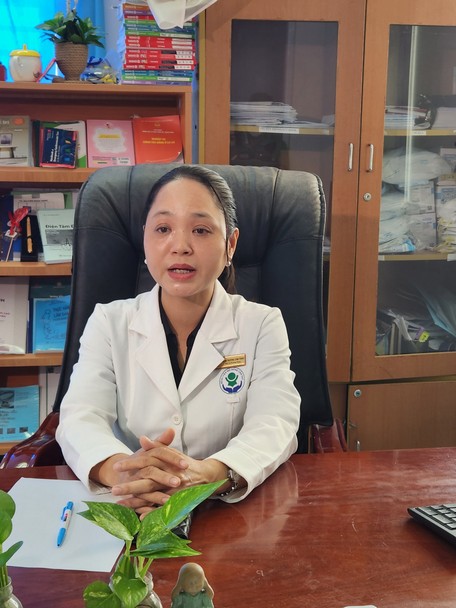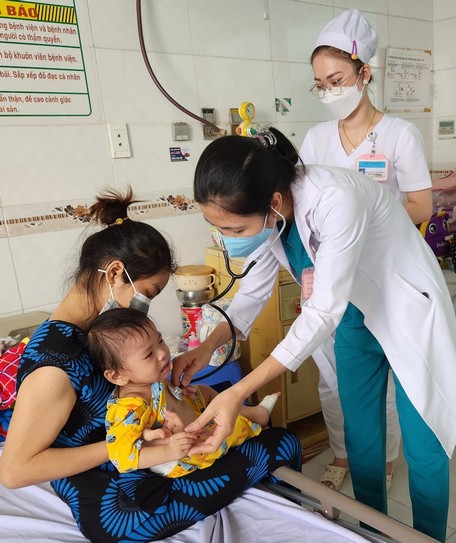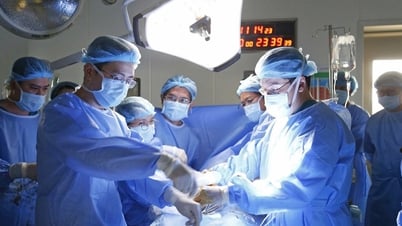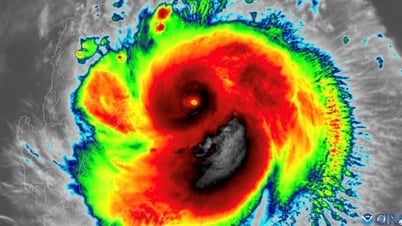Digestive disorders are common in hot weather at all ages, affecting the digestion of food and the health of the patient. Notably, children with long-term digestive disorders are prone to poor absorption, malnutrition and slow intellectual development.
Dr. Truong Cam Trinh - Head of Examination Department, Can Tho Children's Hospital, gives advice to help families with young children recognize digestive disorders in children, treatment methods and prevention of this disease.
 |
* Reporter: Doctor, please tell us what causes digestive disorders?
- Dr. Truong Cam Trinh: The cause of digestive disorders in children is due to weak resistance, especially for children who are not breastfed or not fully breastfed; due to unsanitary eating and drinking, polluted living environment; children entering the weaning period, the microflora is not yet complete, not used to digesting food (food is not fully digested, creating conditions for harmful bacteria to develop); unreasonable diet: Eating a lot of protein, a lot of sugar, little fiber, few vitamins and minerals
On the other hand, when the seasons change, the temperature changes, affecting the quality of food, making it easy for food to spoil. This is the ideal weather condition for viruses, molds, bacteria that cause cholera, typhoid, dysentery, etc. to thrive, which can penetrate the body and cause intestinal infections, leading to digestive disorders. Therefore, the possibility of children getting gastrointestinal diseases and digestive disorders during this time is very high.
In addition, at this time, the baby's body may not have had time to adapt to changes in the weather, so the immune system is very vulnerable to attack. Children are at high risk of respiratory infections, flu, cough, fever, sore throat... At that time, parents tend to give their children Western medicine for treatment. Using medication for a long time can cause an imbalance in the intestinal microflora, leading to digestive disorders in children with symptoms such as abdominal pain, diarrhea, indigestion, and bloating.
*Reporter: When children have digestive disorders, what symptoms will they have? And in what cases should parents take their children to the hospital, doctor?
- Dr. Truong Cam Trinh: When seeing signs or symptoms of digestive disorders in children, it is necessary to take the child immediately to a medical facility so that specialists can examine and accurately diagnose the cause of the disease as well as the correct treatment method. Parents or relatives should not arbitrarily give children antibiotics, stomachache or diarrhea - constipation drugs without a doctor's prescription, which can make the child's condition more serious, affecting their health later on.
Most children with digestive disorders can treat themselves at home with the following principles: drink more to prevent dehydration, eat more to gain strength, quickly restore mucous membranes and grow. In case you need to see a doctor, do not be subjective such as:
- Premature babies, children with chronic illnesses, or children with multiple illnesses at the same time
- Continuous high fever above 38.5 degrees Celsius
- When the child still has diarrhea for more than 3 days
- Unable to eat or drink, vomiting or having bowel movements many times a day, continuously
- Stomach ache, crying a lot
- Symptoms of dehydration (lethargy, fatigue, dry skin, sunken eyes, little urine, ...)
- Unable to eat or drink, vomiting many times
- Bloody stools.
*Reporter: Doctor, in the hot season, food spoils easily and is difficult to preserve. What should parents do to prevent digestive disorders?
- Dr. Truong Cam Trinh: To avoid digestive disorders in children, parents must pay attention: Do not feed children too early, only feed children solid foods when they are 4-5 months old, breastfeed children until 18-24 months old; use clean water for eating and drinking; ensure food hygiene and safety: "eat cooked food, drink boiled water", do not eat raw food, food of unknown origin; maintain personal hygiene, instruct children to wash their hands properly and regularly, wash their hands before eating, after going to the toilet; create a clean, airy home environment around the child; clean the toilet, regularly clean surfaces and objects that come into daily contact such as children's toys, learning tools, doorknobs, stair handrails, table tops, chairs, floors with soap or common detergents.
Limit the spread of pathogens by not dumping waste, laundry water, and sick people's belongings into ponds, lakes, rivers, or wells. If you see signs of digestive disorders in your child, you should take your child to the hospital so that doctors can examine and accurately diagnose the disease and the cause of the disease, thereby providing an accurate treatment plan and providing instructions for dangerous signs that require immediate medical attention. Do not arbitrarily buy medicine for your child to take. Do not arbitrarily give your child antibiotics, anti-diarrheal drugs, etc., as this may not be effective and may harm your child.
 |
| Pediatric patients treated for digestive disorders at the Gastroenterology Department of Can Tho Children's Hospital. |
Have a diet appropriate to the age, diversify foods, pay attention to giving children foods rich in vitamins. For children with digestive diseases, continue breastfeeding if the child is breastfeeding, choose foods that are easy to digest, limit fat, food cooked for children needs to be cooked thoroughly, pureed, divided into many times a day.
* Thank you doctor for taking the time to answer this interview!
THUY QUYEN (performed)
Source link






























































































Comment (0)